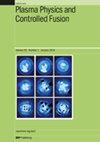Energy gain of wetted-foam implosions with auxiliary heating for inertial fusion studies
IF 2.3
2区 物理与天体物理
Q2 PHYSICS, FLUIDS & PLASMAS
引用次数: 0
Abstract
Low convergence ratio implosions (where wetted-foam layers are used to limit capsule convergence, achieving improved robustness to instability growth) and auxiliary heating (where electron beams are used to provide collisionless heating of a hotspot) are two promising techniques that are being explored for inertial fusion energy applications. In this paper, a new analytic study is presented to understand and predict the performance of these implosions. Firstly, conventional gain models are adapted to produce gain curves for fixed convergence ratios, which are shown to well-describe previously simulated results. Secondly, auxiliary heating is demonstrated to be well understood and interpreted through the burn-up fraction of the DT fuel, with the gradient of burn-up with respect to burn-averaged temperature shown to provide good qualitative predictions of the effectiveness of this technique for a given implosion. Simulations of auxiliary heating for a range of implosions are presented in support of this and demonstrate that this heating can have significant benefit for high gain implosions, being most effective when the burn-averaged temperature is between 5 and 20 keV.用于惯性聚变研究的带辅助加热的湿泡沫内爆能量增益
低收敛比内爆(使用润湿泡沫层限制胶囊收敛,从而提高对不稳定性增长的稳健性)和辅助加热(使用电子束对热点进行无碰撞加热)是两种很有前途的技术,目前正在为惯性聚变能应用进行探索。本文提出了一项新的分析研究,以了解和预测这些内爆的性能。首先,对传统增益模型进行了调整,以生成固定收敛比的增益曲线,结果表明该曲线很好地描述了之前的模拟结果。其次,辅助加热通过 DT 燃料的燃耗部分得到了很好的理解和解释,燃耗相对于燃耗平均温度的梯度被证明可以很好地定性预测该技术在特定内爆中的有效性。为了证明这一点,对一系列内爆的辅助加热进行了模拟,结果表明这种加热对高增益内爆有显著的好处,在烧损平均温度介于 5 到 20 千伏之间时最为有效。
本文章由计算机程序翻译,如有差异,请以英文原文为准。
求助全文
约1分钟内获得全文
求助全文
来源期刊

Plasma Physics and Controlled Fusion
物理-物理:核物理
CiteScore
4.50
自引率
13.60%
发文量
224
审稿时长
4.5 months
期刊介绍:
Plasma Physics and Controlled Fusion covers all aspects of the physics of hot, highly ionised plasmas. This includes results of current experimental and theoretical research on all aspects of the physics of high-temperature plasmas and of controlled nuclear fusion, including the basic phenomena in highly-ionised gases in the laboratory, in the ionosphere and in space, in magnetic-confinement and inertial-confinement fusion as well as related diagnostic methods.
Papers with a technological emphasis, for example in such topics as plasma control, fusion technology and diagnostics, are welcomed when the plasma physics is an integral part of the paper or when the technology is unique to plasma applications or new to the field of plasma physics. Papers on dusty plasma physics are welcome when there is a clear relevance to fusion.
 求助内容:
求助内容: 应助结果提醒方式:
应助结果提醒方式:


